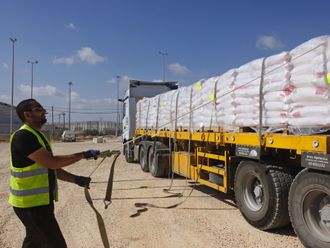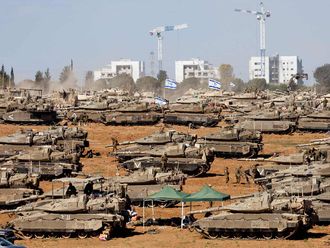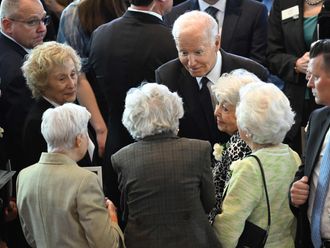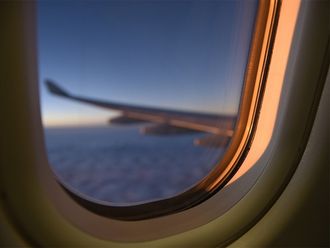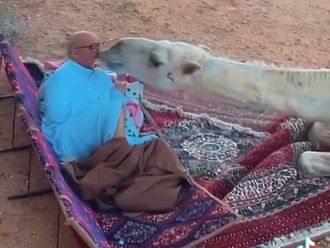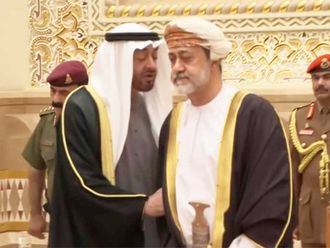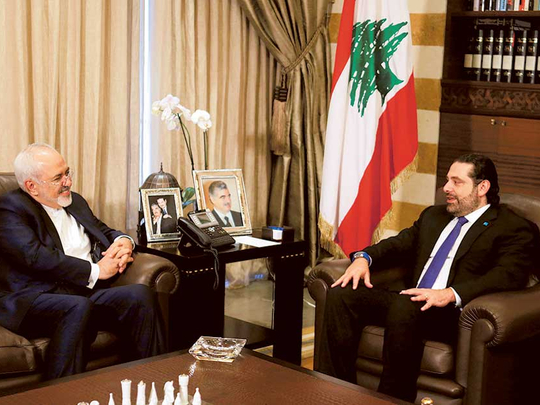
Beirut: Iran’s Mohammad Javad Zarif on Monday became the first foreign minister to meet Lebanon’s new president, underscoring Tehran’s struggle for influence in Beirut.
He met Michel Aoun, a Christian leader who was elected president last week. Aoun is a close ally of Lebanon’s Hezbollah, an Iran-backed Shiite militia labelled by some Gulf states as a terror group, and Iran welcomed Aoun’s election as a victory for Hezbollah.
Speaking at a joint press conference with Lebanese Foreign Minister Jibran Bassil, Zarif said Lebanon’s presidential election should serve as an example to other politically troubled countries in the region.
“The Lebanese people showed it is possible to reach a solution acceptable to all, or what we call a win-win situation,” Zarif said.
Syria’s presidency also dispatched an envoy to Lebanon to congratulate Aoun, the first such official visit in six years.
In a statement, Aoun’s office said he had received “a message of congratulations on his election as president of the republic from his Syrian counterpart Bashar Al Assad carried by Syria’s Minister of Presidential Affairs Mansour Azzam”.
Speaking after the meeting, Azzam said Al Assad’s message included his hope for a “new era which we hope will bring good things, stability and security for the brotherly nation of Lebanon”.
The trip is the first by a Syrian official to Lebanon since 2010, when Al Assad and then-Saudi King Abdullah Bin Abdul Aziz visited the country in a bid to tamp rising political tensions.
Zarif, who was accompanied on the two-day visit by a high- profile political and economic delegation, said he hoped to expand ties with Lebanon.
Former army commander Aoun was elected by the Lebanese parliament as president on October 31, ending a 29-month presidential vacuum. Aoun then asked Sunni leader Sa’ad Al Hariri to start consultations to form a new government, of which Hariri would be prime minister.
The empty presidency was a symptom of an underlying political struggle between rival factions in Lebanon, which has been made worse by the war in neighbouring Syria. It has paralysed decision-making, economic development and basic services, and raised fears for the country’s stability.
The deal to appoint Aoun as president and Hariri as prime minister has underscored Hezbollah’s dominant role in Lebanon.
Zarif said he would meet Hariri on Tuesday.
“In my meeting with Sa’ad Al Hariri tomorrow I will emphasise Iran’s determination to cooperate with all Lebanese people, from any group or ethnicity,” he said at the joint press conference.
Under Lebanon’s sectarian power-sharing system, worked out upon independence and confirmed after a bitter 15-year civil war, the president must be a Maronite Christian, the prime minister a Sunni and the speaker of parliament a Shiite.
Syrian envoy Mansour Azzam, who is head of presidential affairs, greeted Aoun on behalf of Syria’s Al Assad, saying he hoped Aoun’s election would contribute to stability in Lebanon and in the region.
Azzam said there would be “no new page” in Syria-Lebanon relations and they would continue in a balanced way.
Aoun’s meetings with Iranian and Syrian dignitaries came on the same day that Prime Minister-designate Hariri said Lebanon’s new administration was a chance to revive ties with the Gulf Arab countries.
“The formation of the government is a chance to renew the emphasis on Lebanon’s Arab identity and return momentum and heat to Lebanon’s relations with its brethren in the Gulf Cooperation Council,” Hariri said after meeting council ambassadors to Lebanon.



